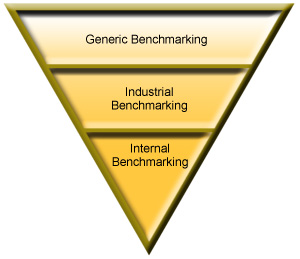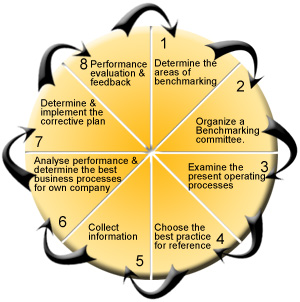| |
 |
| Definition of
Benchmarking |
- Benchmarking is a continuous process of comparing an
organization's products, services and processes against
those of its toughest competitors or those of organizations
renowned as world class or industry leaders.
- In many companies, benchmarking is a key component of
the total quality management. Profitability and growth
flow from a clear understanding of how the business is
performing, not just against its previous accomplishment,
but against the toughest competitors or world-class organizations.
|
| Types of Benchmarking |
- Internal Benchmarking: Comparing similar activities
between different departments, divisions, regions and
business units within an organization.
- Industrial Benchmarking: Comparing products, services,
processes and results against direct competitors in the
same industry.
- Generic Benchmarking: Comparing the best practice business
processes of organizations from different industries.
|
 |
| Types of Benchmarking |
Reference for Comparison |
Example |
Information Accessibility |
Innovationess |
| Internal Benchmarking |
Comparing similar activities between different departments,
functions, regions within the same organizations. |
Merchandise in Watsons Vs in Park'N shop |
Easy |
Little |
| Industrial Benchmarking |
Compare with direct competitors in the same industries |
Cafe de Coral Vs Maxim's |
Difficult |
Medium |
| Generic Benchmarking |
Compare the best practices of orgaizations from different
industries |
Sales & Marketing of P&G, Customer Service
of Hang Seng Bank |
Medium |
High |
|
| |
| Results Comparison
& Processes Comparison |
- Results comparison can give you information regarding
your own market position and performance discrepancy (if
any), but you don't know how to shorten the discrepancy
or out-compete your competitors.
- Processes comparison can give you information on how
to shorten the discrepancy or out-compete your competitors.
- Therefore, Benchmarking is not only a "Number Comparison
Game"
|
| Procedures of
Benchmarking |
 |
| Key Success Factors
for Benchmarking |
- Top management's commitment, involvement & support
- Well preparation
- Open-minded, accept new & innovative matters
- Clear understanding on organizations' critical success
factors & processes
- Provide benchmarking training to relevant employees
- Areas for benchmarking should not be too board for each
single time
- Clear self understanding before doing comparison
- Find the best practice business process if possible
- Follow the predetermined standard
- Share information with partners voluntarily
- Focus on processes improvement
|
| Application &
Value of Benchmarking |
- Benchmarking can apply to most measurable & observable
areas, include:
-Products & services
-Processes
-Support functions
-Organization performances
-Strategies
- Benchmarking is a key component of Total Quality Management.
It facilitates continuous improvement of organizations
to achieve a better performance.
- Benchmarking can facilitate the change of corporate
culture, motivate managers and employees to continuously
compare the best practices of other organizations in order
to improve self performance.
|
| Conclusion of
Benchmarking |
- Benchmarking is a concept, attitude, tool or management
system
- Benchmarking is a practical management tool. By using
a best organization as a reference, it can improve an
organization's processes and performance in an effective
and efficient way.
- The ultimate goals of benchmarking is learning, improvement,
enhance business competitiveness and performance improvement.
- Benchmarking emphasize proper transfer and adoption
(according to own situation), but not "totally transfer".
|

